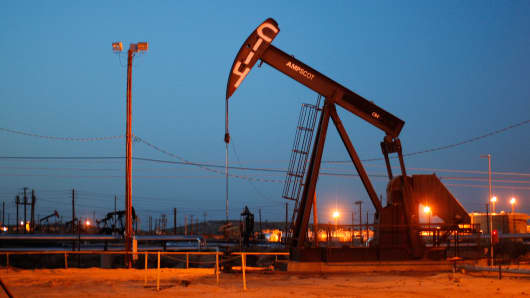In response to a question from Reuters, the company said "the Rosebank project is in the Front End Engineering and Design phase. The review of the economics and the additional engineering work is progressing....It is premature to make any statements on an FID date."
Hodée said any offshore project with a development cost above $30 a barrel would most likely be put on hold in current oil prices.
Norway's Statoil this week said it had postponed until next October—a six-month delay—a decision to invest $5.74 billion in the Snorre field in the Norwegian Sea as its profitability was under threat.
New oil fields typically require four to five years to be developed and billions before the first drop of oil is produced.
Any cutbacks in oil production bodes ill for international oil companies that are already struggling to replace depleting reserves as exploration becomes harder and discoveries smaller. It also points to tighter supplies by the end of the decade.
Least likely
Projects in Canada's oil sands, which require expensive and complex extraction techniques, are the most unlikely to go ahead given their high investment requirements and relatively slow returns. Total recently decided to postpone the FID on the Joslyn project in Alberta, the cost of which Hodée estimated at $11 billion.
Shell's liquefied natural gas (LNG) project in Canada's British Columbia, already under pressure from a looming supply surge, faces further strain in the current price environment, analysts said. According to research by Citi, the project requires oil at $80 a barrel to break even.
Royal Dutch Shell's chief financial officer Henry Simon indicated in October that it was "less likely" to go ahead with unconventional projects in West Canada if oil falls below $80 a barrel.
Asked by Reuters what the company's current thinking was, a Shell spokesman would not comment on "internal decision-making."
Even in the Gulf of Mexico, one of the most attractive oil production areas in the world, projects are facing challenges.
BP last year put on hold a decision on its Mad Dog Phase 2 deep water project in the Gulf of Mexico after its development costs ballooned to $20 billion and the oil major is now expected to further delay an investment on the field's development.
"BP were talking positively about bringing it back, but now it may be put on hold," BMO Capital Markets analyst Iain Reid said.
BP's chief financial officer Brian Gilvary however said in an analysts briefing in October that he expected Mad Dog Phase 2 to be sanctioned in the first quarter of 2015.
Statoil's Johan Castberg field in the Barents Sea, which was expected to get its FID in 2015, seems unlikely to get the go-ahead at the moment given it has an estimated project cost of $16 billion to $19 billion, Hodée said.
Statoil said that the final project design is due in the summer of 2015. Its giant Johan Sverdrup field in the North Sea is still on track for development with a price tag of $32.5 billion.


